'Today, there is pervasive fear in society; an uncertainty of what might happen.'
'This has forced Muslims to shrink further into mental ghettos, with many considering extreme measures like pretending to change their identity.'
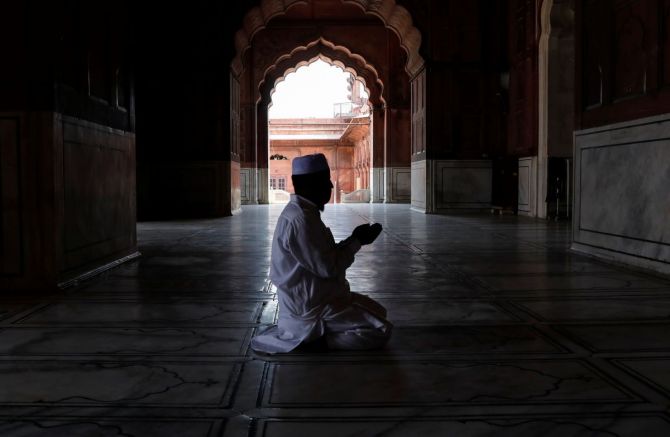
In 2017, then Vice President Hamid Ansari, in his parting interview to Rajya Sabha TV, had said that 'a feeling of unease and insecurity is creeping in among Muslims in India'.
Unsurprisingly, his comments created a political storm in the country with many stating that Ansari was exaggerating the current scenario and that it wasn't disadvantageous to be a Muslim as was being projected by him.
But then what does it mean to be a Muslim in today's India?
In her book, Born A Muslim: Some Truths About Islam in India, Ghazala Wahab , executive editor, Force magazine, tries to answer that question through compelling examples of Muslims hiding their identity, or carrying the burden to prove themselves as secular in the presence or in the eyes of non-Muslims.
In an e-mail interview with Syed Firdaus Ashraf/Rediff.com, Wahab says, "Even during the worst of communal violence, Muslims had the confidence that the media would tell their stories of suffering. Today, the media is both the agent provocateur and the cheerleader for vilification and criminalisation of Muslims. Muslims have never had it this bad."
Many books have been written on the subject of Indian Muslims and almost every year we see one or the other being published. What do these books lack that you felt the need to write another one?
Every book is a book too little. We need more non-fiction accounts of people who feel disaffected and marginalised, or find themselves unheard. Though we, both Muslims and Hindus, have had a tradition of oral history, today the written word has greater credibility. So, all written accounts become part of contemporary history writing.
I was driven by this sentiment. I believe I had something to say that needed to be said and which had not been said before.
In tangible terms, there are three aspects to my book.
One, how India has been critical to the evolution of Islamic thought. It was not just any region that Muslims invaded or came to. Shah Waliulluh's influence and legacy have been enormous on sects like Barelvi and Deobandi (with the latter's reach going beyond India's borders), and proselytising movements like Tablighi Jamaat and Jamaat-e-Islami.
In turn, both of them wield influence well beyond the Indian subcontinent. In fact, to Tablighi Jamaat goes the credit of giving some sort of physical marker to Islamic identity.
Two, it is a chronicle of the very systematic marginalisation of the Muslims since the beginning of the 20th century, by putting all kinds of labels on them, starting with being outsiders, and now jihadis.
And three, I have recommended measures which Muslims can adopt to improve their position in life without waiting for the government. So, in this respect, my book is also prescriptive. I am not aware of many books which are prescriptive in nature.
Was it at school that you got the feeling of 'being the other' since you were the only Muslim girl in a convent school, or did that feeling grow later in life? And did that bother you as a child, the 'feeling of being the other'?
The truth is, I have never felt like the 'other' at any stage in my life. In my school, despite being the only Muslim girl for several years, I never perceived any kind of discrimination or prejudice.
Even when my friends asked me questions about Islam, I never considered them as prejudiced. I regarded the questions as evidence of their genuine interest in me and my faith.
Later, when I moved to another school and had one more Muslim girl in my class, we both had our own circle of friends. We never became friends.
Later, when I moved to Delhi, I never had any problem in finding rented accommodation. For several years I lived in south and east Delhi as a tenant before moving into my own apartment.
Maybe I was fortunate. Or maybe there was a message in this -- that despite widespread discrimination, there are pockets of hope which we need to expand. I believe that to a large extent, this self-assurance gave me the confidence of writing a book of this nature.
'Forever suspects and forever scapegoats'. Will these two identities be permanently attached to Muslims of India or do you think things can change?
I think we are doomed if we believe for a moment that things cannot change in the future. As the Dalai Lama once said, anything is possible in the future. And I believe in the possibility of everything.
Can you describe why December 6, 1992 ,was a turning point for every Indian Muslim? What changed for them?
The demolition of the Babri Masjid was not just a betrayal, but also the most visible manifestation of hatred. It induced shock and disbelief because it was unprecedented and so unexpected, somewhat akin to 9/11.
Until the Babri demolition, the mob was a faceless entity. But after this, when the mob was owned (while Bal Thackeray did this openly, the presence of the Bharatiya Janata Party politicians did it subtly), it developed a face.
A mob with a face is a frightening thing. It gives it impunity. And in the violence that followed the demolition, we saw a new kind of viciousness, as if a historical wrong was being righted.
This also saw the establishment of India's biggest ghetto in Mumbra on the outskirts of Mumbai.
However, the biggest change that we saw was in the transformation of criminals into terrorists. The bomb blasts in Mumbai were the direct consequence of the riots of 1993. This gave Pakistan an opening on mainland India.
Remember, it already had a supply chain (in a manner of speaking, in Kashmir), all it now needed was to divert some funds, weapons and human resource on the mainland.
Using the network of compromised government officials and unemployed Muslim youth on the fringes of the society it established sleeper cells in several parts of the country.
Hence, despite having suffered communal violence and living in the dread of the next riot, Muslims now had to also deal with the tag of being terrorists. This has been the heaviest burden to carry.
You mention that three factors unite Indian Muslims. Firstly, craving for a uniform pan-Islamic identity created by Saudi Arabia, secondly relative socio-economic backwardness and thirdly discrimination by state authorities.
Is there no fourth or fifth identity? Like Hinduised Muslims, as the RSS (Rashtriya Swayamsevak Sangh) would say?
I do not entirely agree with this question. Muslims are not a monolith group. They wear multiple identities, and no one definition will fit all Muslims in all the parts of India.
Both socio-economic backwardness and discrimination by state authorities, are largely a north Indian phenomenon; and a consequence of Partition.
The craving for a Saudi-inspired Islamic identity is a recent phenomenon; and has to do with the Saudi outreach and the Indian working class in the Gulf.
I don't know what you mean by Hinduised Muslims. If you are referring to Muslim politicians who are either members of the BJP or aspire to be members of the BJP, then I wouldn't categorise that as an identity. These are opportunist Muslims without any conviction, much less an identity.
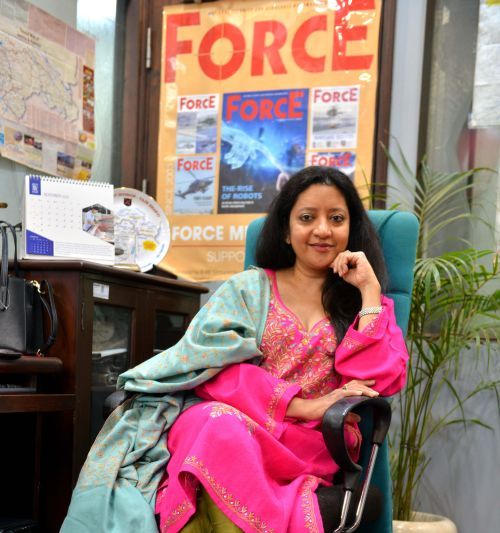
How long do you think Muslims of India can continue with their victimhood mentality? How can that be changed, and that too, in the current political scenario?
A victimhood mentality suggests a mindset without any basis in reality. Today, Muslims are victims; they do not suffer from a victimhood mentality. The community in which a large number suffers from a victimhood mentality is the Hindu.
Despite all evidence to the contrary, many Hindus believe that they are in danger of being outnumbered by Muslims. Despite laws, law-makers and law enforcement agencies being sympathetic towards them, they believe that Hindus do not get a fair deal in India.
Despite blatant Hinduisation of our public spaces, many still believe that Muslims are a pampered lot. Only Hindus can work on changing this victimhood mentality. There is nothing that Muslims can do to help them.
In your book you write that a Muslim will never stand for another Muslim in a public place because his insecurity is too deep-rooted to take a stand. Would you like to explain more about this statement?
This stems from a Muslim's insecurity and sense of guilt because of Partition. Weighed down by this twin burden, they are always cautious of the way they are perceived by society in general.
The need to show that they are secular prevents them from speaking up for a fellow Muslim. Or when they do so, they do it with a caveat, drawing equivalences. See, how quickly they rush to condemn acts of violence by Muslims anywhere in the world.
In fact, non-Muslims, and sensible Hindus, attempt to put violence in a political context, in case there is one. Muslims do not do so. Nothing less than a blanket condemnation reassures them.
You have been harsh on the RSS in the book. It seems that you have presented only one side where you say it is only the RSS and the RSS which is responsible for riots right from 1927 till date. Is that so?
What about the Congress who were ruling or for that matter Muslim fundamentalists triggering riots?
The truth is the RSS is peripheral to my book. I have referred to it only in the context of systematic vilification of Muslims.
As far as riots are concerned, there are two aspects to them.
One, creating the conditions for violence and instigating it. Two, allowing the violence to take its course and then botch up or ignore the enquiry commissions, thereby not pinning responsibility on the rioters. I have given several examples in the book where successive Congress governments were guilty of the latter. But for the former, my research showed that none could match the RSS and its cohorts.
The only act of violence, massacre actually, where the Congress party was guilty of both offences, was the 1984 anti-Sikh pogrom. And I have written about it.
Would you consider the 1980s as the worst for Indian Muslims in terms of riots, or from 2014 till date where lynching of Muslims by mobs has become the order of the day?
The 1980s saw several large-scale riots and instances of one-sided violence, including at the hands of the law enforcement agencies. But the situation since 2014 has been unparalleled in the history of independent India.
Large-scale violence has been replaced by small scale, impromptu everyday violence. Today, there is pervasive fear in society; an uncertainty of what might happen. This has forced Muslims to shrink further into mental ghettos, with many considering extreme measures like pretending to change their identity.
Even during the worst of communal violence, Muslims had the confidence that the media would tell their stories of suffering. Today, the media is both the agent provocateur and the cheerleader for vilification and criminalisation of Muslims. Muslims have never had it this bad.
After reading your book one gets the feeling that the what the Hindu-dominated Indian State wants, it gets.
Why is that then Muslims come out on the street to protest and lose lives? When will they get some sense that they are fighting a hopeless battle?
I am sorry if you got this sense from reading my book. I am suggesting the exact opposite of this. The battle becomes hopeless when you stop fighting. As long as you are fighting, there is hope. And I am temperamentally a very hopeful person.
You completely missed writing in detail about the terror groups started by young Indian Muslims like the Indian Mujhadeen among many others.
I do not believe that there is any threat of terrorism by Muslims in India. Even at its peak the Indian Mujahideen was a fringe outfit, which was portrayed as larger than what it was by law enforcement agencies.
Why do Muslim-exclusive political parties not succeed in India? Do you think the Owaisis' party has a future?
Muslims are too powerless, too divided and too widespread to be represented by one Muslim-specific political party.
All Muslim political parties are regional parties. Given the population mix, they cannot afford to talk only about Muslim issues. They perforce have to talk of regional issues. Once they do that, they become like any other regional party, though helmed by a Muslim.
This dissipates their core base, without enlarging it. Hence, while non-Muslims always view them with suspicion, Muslims remain sceptical of their potential to deliver. And that's why they fail.
Owaisi's party, like Badruddin Ajmal's in Assam, is personality-driven. It draws its power from the charisma of the leader. Its future is intrinsically linked to the future of its leader.



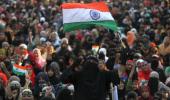
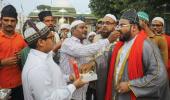





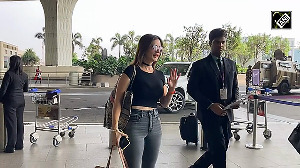
 © 2025
© 2025